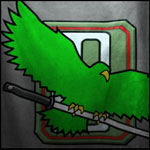Posted 21 October 2015 - 12:06 AM
I blame the whiny player base. The entire reason this got implemented in the first place was because so many players complained about stomps. Actually, that's the reason behind pretty much EVERY change to the group queue.
3,3,3,3 was fairly balanced. Some variations in PSR led to stomps late at night when the active players got smaller, but overall a large majority of the matches came down to teamwork, and nothing more. The frequent 12-1, 12-3 type games were a testament to the system WORKING, as this often indicated a very small PSR difference between the teams. One team makes a mistake, loses a couple players, and it snowballed from there. It's much, much easier to have a close game as the PSR gap widens, as more players make mistakes on both sides that allow each team the chance to come back from early setbacks.
Obviously there's a few outlying games. Those ones you can just judge from the names on both sides that the matchmaker screwed up, but in the grand scope of things it really didn't happen that often. It's just a 12-0 stomp in less than 3min generally rubs you the wrong way more than all the other losses do, so you're more likely to think it's happening more often.
The only thing this change accomplished is introduce more imbalance by allowing teams to capitalize on chassis imbalance, whereas before the outlying chassis were limited. It took games where the main factor was just simply teamwork, and added a factor in that actually unbalances the game.
If anything, I just hope it goes back to 3,3,3,3. PGI should set up preferences in the MM so small groups get matched up with other small groups as often as possible, and larger groups matched with larger groups. No hard-coded, "12 MUST fight 12," rules or anything like that. Just simply a "preference." Larger groups may have to wait a little bit longer, but that should be the cost. Right now search times for a full 12man are actually fairly quick, as the MM is very quick to throw a bunch of small groups against them. A 2-5 minute longer wait to find a large group for a large group isn't that bad, and probably won't be much longer at all if the PSR gap is allowed to widen a little bit for larger groups.
Want to play as a large group? Be willing to accept some PSR fluctuation and a little extra search time in order to find you a similarly sized group. Besides, as a group gets larger and more coordinated, the less of an impact PSR has on the game. A solid Tier 3 average team with good coordination CAN give a Tier 2 or even a Tier 1 team a good fight, and while the two teams are different in their PSR averages, a large Tier 3 vs. a similar sized Tier 2 is going to be a more balanced match than a large Tier 3 vs. multiple small groups of Tier 3s, 2s, and 1s.
So let's summarize:
- Bring back 3,3,3,3.
- Set a preference in the MM to take extra time to match groups by size.
- Set release valves to avoid "forever searches." The worst case scenario is the MM behaves like it did before. The important part is that it's TRYING to find larger groups before throwing the large group against multiple small ones.
- Allow a larger PSR gap when trying to find a match as the group gets larger. Coordination > PSR average.
What this "should" accomplish:
- Large groups get matched against large groups more often.
- Small groups get matched against small groups more often.
- In the event of low population, small groups MAY face a large group if they've been searching for too long, but it's rare enough that most small groups don't run into this scenario more than once or twice in an average night of playing.
- No need for 4 max.
- No need for silly tonnage limits.
No fix to the MM is going to be perfect. There's going to be a particular subset of players who get shafted. Right now when comparing solos, small groups, and large groups, the small groups are the ones currently getting the shaft. With the recommendations above, the ones that will most often get the shaft are less coordinated large groups, but out of all the players that will need to bite the bullet, these are actually the best ones. Going up against tougher teams outside of their PSR is good practice, which is what most large groups are doing anyway.
AND IF the opposition is too tough for the night, and that large group of average Joe's just can't seem to catch a break from the really tough teams, they can always split into smaller groups and be placed into games with smaller groups closer to their PSR average.
It's not quite the, "Everybody Wins," scenario we all want, but I guarantee you this would work better than any current or previous attempts we've had.
 Stefka Kerensky, on 20 October 2015 - 09:40 PM, said:
Stefka Kerensky, on 20 October 2015 - 09:40 PM, said:





























